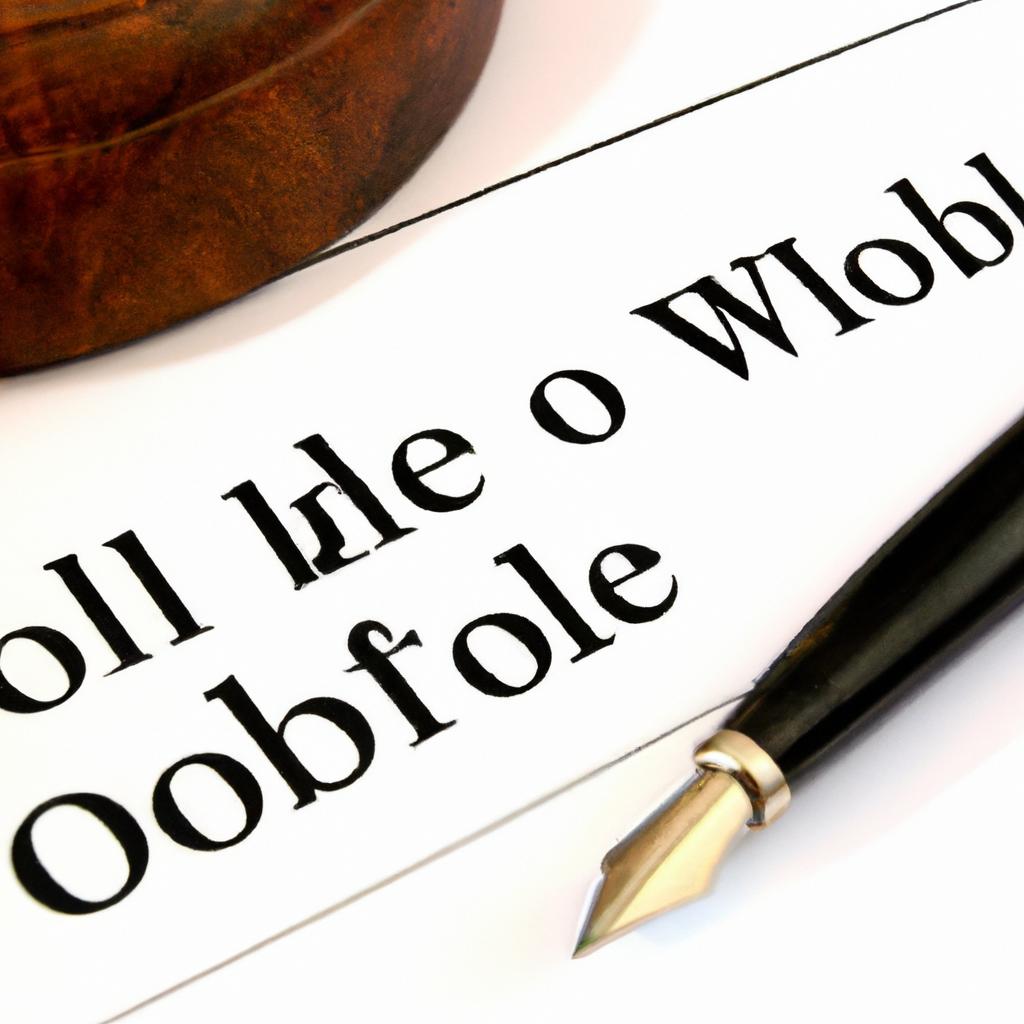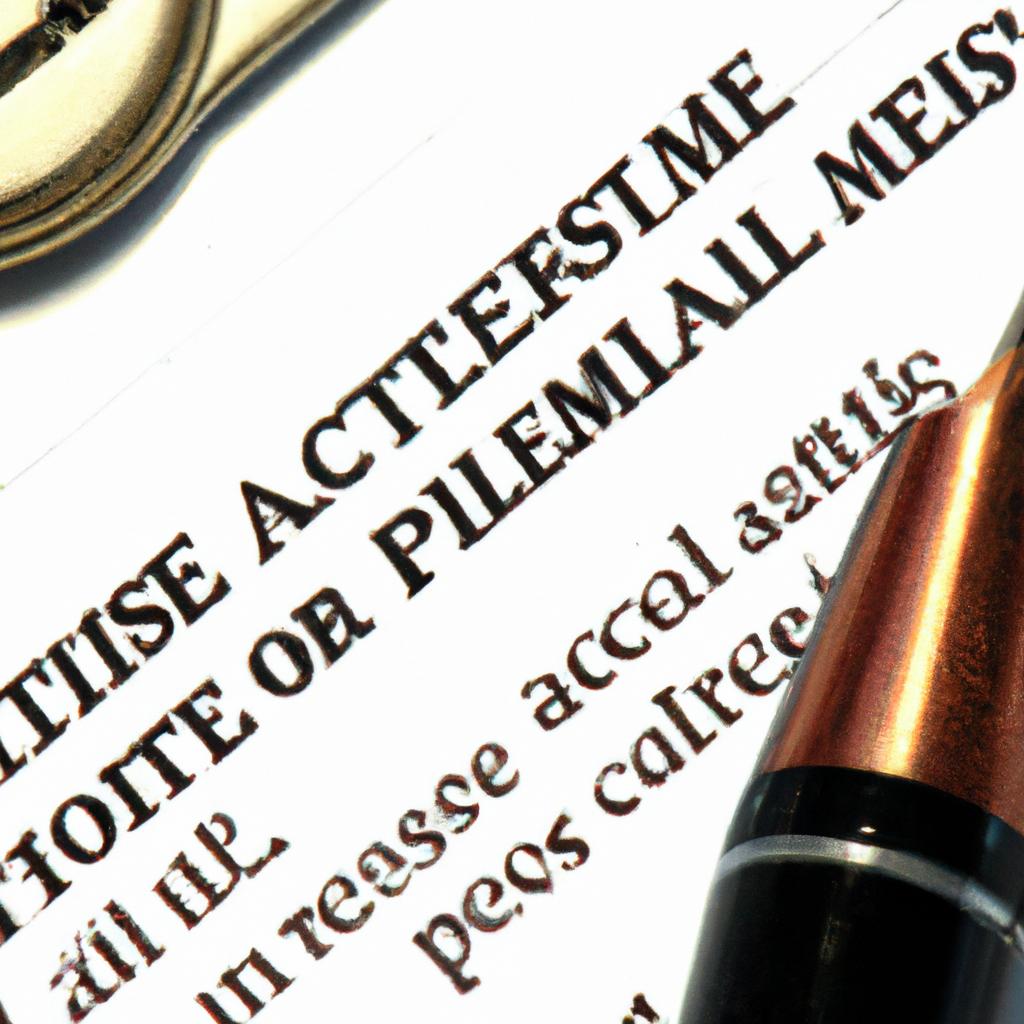Probate. Just the word alone can strike fear and confusion into the hearts of many. But fear not, dear readers. As experienced legal professionals at Morgan Legal Group in the heart of New York City, we are here to demystify the often daunting process of probate. Today, we delve into the question of when exactly a will must be probated, shedding light on this intricate legal procedure that governs the distribution of a deceased individual’s assets. So sit back, relax, and let us guide you through the ins and outs of probate law.
When Should a Will Be Probated?
Probate is the legal process of validating a will and distributing the assets of a deceased individual according to their wishes. While the general rule is that a will should be probated within a few years of the person’s passing, there are specific scenarios when it is necessary to begin the probate process:
- Assets Need to be Distributed: If the deceased had assets that need to be transferred to their beneficiaries, probate is typically required to legally transfer ownership.
- Debts and Taxes: If there are outstanding debts or taxes owed by the deceased, probate may be necessary to settle these obligations using the assets from the estate.
It is important to consult with a qualified attorney to determine when a will should be probated based on the individual circumstances of the deceased and their estate. At Morgan Legal Group, we have extensive experience in handling probate cases and can provide guidance on the best course of action to ensure the smooth administration of the estate.

Understanding the Probate Process and Its Importance
Probate is the legal process through which a deceased person’s will is proven in court and accepted as a valid public document. This process is important as it ensures that the deceased person’s assets are distributed according to their wishes as outlined in their will. Probate also serves to validate the will, settle any outstanding debts or taxes, and transfer assets to the rightful beneficiaries.
It is important to note that not all wills have to go through the probate process. In fact, there are certain circumstances in which probate may not be necessary, such as when the deceased person’s assets are held in a living trust or when the value of the estate falls below a certain threshold. Consulting with an experienced probate attorney can help determine whether or not a will needs to be probated based on the specific details of the estate.

Determining the Assets Subject to Probate
is a crucial step in the administration of a deceased individual’s estate. Not all assets are subject to probate, and understanding which assets require probate can help streamline the process and avoid unnecessary delays. Assets subject to probate typically include:
- Real estate owned solely by the deceased
- Bank accounts and investments held solely in the deceased’s name
- Personal property such as vehicles, jewelry, and artwork owned solely by the deceased
On the other hand, assets that do not typically require probate include:
- Property held in joint tenancy with rights of survivorship
- Assets held in trust
- Life insurance proceeds payable to a named beneficiary
In order to determine which assets are subject to probate, it is essential to review the deceased individual’s will, as well as any other estate planning documents they may have had in place. Additionally, thorough documentation of the deceased individual’s assets and liabilities will help ensure that all necessary steps are taken in the probate process.
Key Factors to Consider Before Initiating the Probate Process
Before initiating the probate process, there are several key factors that must be considered to ensure a smooth and efficient administration of the estate. One important factor to consider is the validity of the will. The will must be the original document and it must meet all legal requirements, such as being signed by the testator and witnessed by two individuals who are not beneficiaries. If there are any issues with the validity of the will, it could delay the probate process.
Another factor to consider is the assets of the estate. It is important to take an inventory of all assets and determine whether they need to go through probate. Assets that have designated beneficiaries, such as life insurance policies or retirement accounts, may not need to go through probate. Additionally, if the estate is subject to estate taxes, this must be taken into account before initiating the probate process. Proper planning and organization of assets can help streamline the probate process and ensure that the estate is administered according to the wishes of the deceased.
Q&A
Q: What is probate and when does a will have to be probated?
A: Probate is the legal process of validating a will and distributing the assets of a deceased person according to their wishes. A will generally has to be probated when the deceased person owned assets solely in their name at the time of their death.
Q: Are there any exceptions to when a will has to be probated?
A: Yes, there are some exceptions to when a will has to be probated. For example, if the deceased person held assets jointly with another person, those assets may pass directly to the surviving joint owner without the need for probate. Additionally, assets held in a trust or designated beneficiaries such as retirement accounts or life insurance policies may also bypass probate.
Q: How do I know if a will needs to be probated?
A: If you are unsure whether a will needs to be probated, it is recommended to consult with a probate attorney. They can review the deceased person’s assets and determine if probate is necessary based on state laws and the specific circumstances of the case.
Q: What is the process of probating a will?
A: The process of probating a will typically involves filing the will with the appropriate court, notifying heirs and creditors, inventorying and appraising assets, paying debts and taxes, and distributing the remaining assets according to the terms of the will. The complexity and duration of the probate process can vary depending on the size of the estate and any disputes that may arise.
Q: Are there any alternatives to probate?
A: Yes, there are alternatives to probate that can help expedite the distribution of assets and avoid the costs and delays associated with probate. These alternatives may include setting up a living trust, naming beneficiaries on accounts and property deeds, and gifting assets while alive to reduce the size of the estate subject to probate. It is important to consult with a legal professional to determine the best option for your individual circumstances.
Insights and Conclusions
In conclusion, understanding when a will has to be probated is essential for ensuring the deceased’s wishes are carried out and assets are distributed properly. By following the necessary legal procedures, beneficiaries can avoid potential conflicts and delays in the probate process. Remember, seeking guidance from a legal professional can help navigate this complex and often overwhelming process. Whether you are a beneficiary or an executor, knowing when and how to probate a will can bring peace of mind during a difficult time.
 >
>
When Does a Will Have to Be Probated?
The passing of a loved one is a difficult time, and dealing with their estate and assets can only add to the emotional burden. However, it is essential to handle these matters promptly and correctly. One crucial step in this process is probate, which can often be confusing and overwhelming for those unfamiliar with the concept. In this article, we will guide you through the basics of will probate, including when it needs to be done and what it entails.
What is Probate?
Probate is a legal process that deals with the distribution of a deceased person’s assets and debts. It confirms the validity of the deceased person’s will and authorizes the executor (the person responsible for handling the estate) to distribute the assets to the beneficiaries named in the will. If the deceased did not have a will, the intestate laws of the state will determine how the estate is divided. The probate process is crucial to ensure that the deceased’s wishes are carried out and to avoid conflicts and disputes among family members.
When Does Probate Have to Be Done?
Probate is required when a person dies with assets solely in their name. It does not matter whether the assets are significant or not; if they are in the deceased’s name, probate must be done. However, not all assets are subject to probate. Assets that are jointly owned, have designated beneficiaries, or are held in a trust do not need to go through the probate process. Let’s look at these in more detail.
Jointly Owned Assets:
If the deceased person held assets jointly with another person, these assets automatically pass to the co-owner and do not need to go through probate. Examples of jointly owned assets include real estate, bank accounts, and investments. However, it is essential to note that if the co-owner is also deceased, probate may be necessary to transfer the asset to the next line of succession.
Designated Beneficiaries:
Certain assets, such as life insurance policies, retirement accounts, and payable-on-death (POD) bank accounts, allow the owner to designate a beneficiary. In these cases, the asset will pass directly to the designated beneficiary without going through probate.
Assets Held in a Trust:
Assets held in a trust are not subject to probate. A trust is a legal arrangement where a trustee holds the assets for the benefit of the beneficiaries. The trustee is responsible for managing and distributing the assets according to the terms of the trust. Since the assets are technically owned by the trust and not the deceased, they do not need to go through probate.
What is the Process of Probate?
If a probate is required, the process can be complex and time-consuming. However, it can be broken down into the following steps:
1. Filing a Petition:
The first step in probate is to file a petition with the probate court. This petition includes the deceased person’s death certificate and their will, if they had one. The court will then appoint an executor or personal representative to handle the estate’s affairs and oversee the probate process.
2. Notifying Heirs and Creditors:
Once the petition has been approved, the executor must notify all heirs and creditors of the deceased’s death and the probate process. This allows potential creditors to make claims against the estate and gives heirs the opportunity to contest the will if they believe it is invalid.
3. Inventory of Assets:
The executor must compile an inventory of all the deceased’s assets, including real estate, investments, bank accounts, and personal property. This inventory must be presented to the court for approval.
4. Payment of Debts and Taxes:
Before distributing assets to the beneficiaries, the executor must settle any outstanding debts and taxes owed by the deceased. This includes filing the final income tax return and paying any estate taxes.
5. Distribution of Assets:
After all debts and taxes have been paid, the executor can distribute the remaining assets to the beneficiaries according to the will’s instructions or state intestate laws if there is no will.
6. Final Accounting:
Once all assets have been distributed, the executor must submit a final accounting of the estate’s finances to the court for review and approval.
How Long Does Probate Take?
The length of the probate process varies depending on the complexity of the estate and any disputes that may arise. In straightforward cases, the process can take about six to nine months. However, it can take years if there are significant assets, multiple heirs, or disputes among beneficiaries.
Benefits and Practical Tips:
While the probate process can be lengthy and overwhelming, it is necessary to ensure that the deceased’s assets are distributed correctly. Some key benefits of probate include:
1. Protection against fraud: The probate process requires a thorough review of the deceased’s assets and debts, reducing the risk of fraud or deception.
2. Legal clearance: Once the probate process is complete, the heirs can rest assured that they have legally obtained their inheritance, and there will be no future claims against their assets.
3. Fair distribution: Probate ensures that the assets are distributed according to the deceased’s wishes or the state’s intestate laws, leaving little room for disputes or conflicts among family members.
To make the probate process smoother and more manageable, here are a few practical tips to consider:
1. Hire an attorney: While it is not a legal requirement, hiring an experienced probate attorney can make the process easier and ensure that all legal requirements are met.
2. Keep accurate records: The executor must maintain thorough records of all steps taken during the probate process, including inventory, notices of creditors, and distributions to heirs.
3. Be patient: Probate can be a slow and frustrating process, but it is crucial to remain patient and follow the proper procedures to ensure the estate’s assets are distributed correctly.
In Conclusion:
Probate is a necessary legal process that must be done when a person dies with assets solely in their name. While it can be complex and time-consuming, understanding the basics can ease some of the stress during this difficult time. Remember to seek legal assistance and follow proper procedures to ensure a smooth and fair distribution of the deceased’s assets.


